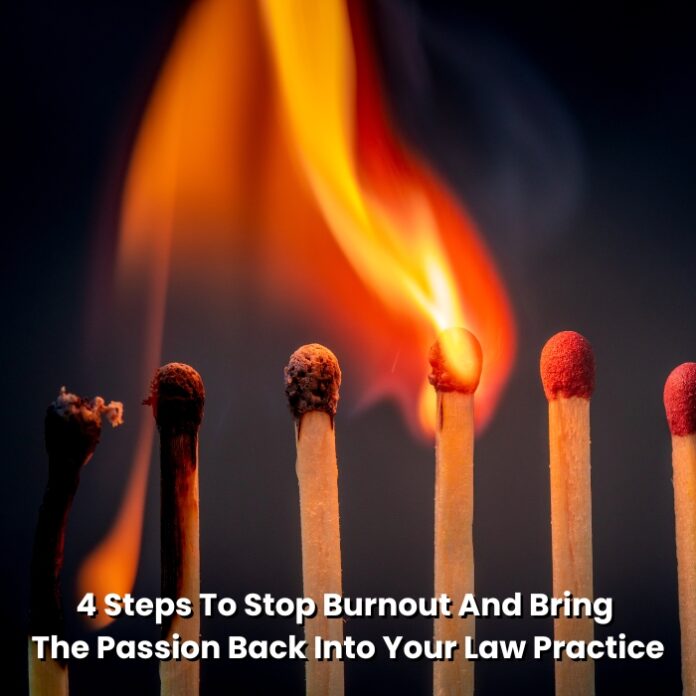So you’re the star lawyer in your firm. You win 90% of your cases; you’re an amazing negotiator, and you’re planning to make partner this year. You make pulling all-nighters look so easy.
But perhaps you’re harboring a secret: under the cool veneer, you’re starting to crack. You’re waking up every morning feeling exhausted instead of refreshed. Your fuse seems to be shorter and shorter; you’re irritable more days than not.
If working hours have taken over the time you used to spend with your family, friends, or taking care of yourself, if you constantly feel listless, tired, stressed, depressed, or dispassionate about work, chances are you’re headed for—or have already arrived at—burnout.
Burnout: A Modern Day Disease
Believe it or not, burnout has made it to the 11th Revision of the International Classification of Diseases (ICD-11). Described as an “occupational phenomenon,” it is characterized by “feelings of energy depletion or exhaustion; increased mental distance from one’s job…and reduced professional efficacy.”
Burnout in women in the law practice is also prevalent. Although more women than men enter the field of law today, women also leave at double the rate that men do. Only 19% of women become equity partners in their firms—and burnout is no doubt a contributing factor.
I’ve been a social justice attorney for over 30 years, and I’ve been where you are. I’ve been caught in a cycle of work and stress, constantly pushing myself to maintain my “high performer” status. The elephant in the room, of course, is that it isn’t just the long hours that drain you. It’s living and working within that traditional competitive model, clawing your way to the top, feeling like you have to be better than the next person to be worth anything at all. It’s inauthentic and utterly exhausting.
And I know firsthand what that lifestyle costs. Physically, mentally, emotionally: the price is too high.
So how do we stop burning the candle at both ends?
4 Steps to Prevent or Recover from Burnout
- Make sleep mandatory. When you’re working on a settlement for your clients, there are some items that you can’t budge on. In your personal life, sleep should be one of them. Research has shown that adults need 7-8 hours of sleep every night to perform at optimal levels. Sleep isn’t a “nice to have,” it’s a “must have” to ensure that you’re mentally sharp, thinking clearly, and supporting your physical health. . So, take care of yourself: eat right, sleep right, make time for exercise. You have one body, one life: give it the best care.
- Rediscover what you love about the law. If you’re pushing yourself too hard, that career you were so passionate about can become just a J-O-B. Reflect on why you fell in love with the law in the first place? Was it being able to help the underprivileged and marginalized? Was it the thrill of arguing your case in court? Reconnecting with that spark can help you work in a way that feels more aligned with your love for the law.
- Understand the price you’re paying. Work demands can seem both urgent and important, which often means that we prioritize them over other things that matter a great deal: health and relationships. Think about what your current lifestyle is really costing you. You may be spinning into burnout because you think that’s the only way to get ahead. But there’s a better way, which leads to . . .
- Reframe what’s possible. You might be heading into burnout because you believe it’s the only way to win. I’m here to tell you that you’re buying into a myth. That myth is founded on an overly aggressive, traditionally “masculine” approach to work. And because we’ve been conditioned by society, we’ve all unconsciously believed that approach is the only way to get ahead. It’s time to reframe the path to success.
Reframing the path to success is exactly what I teach through the Art of Feminine Negotiation. Instead of spiraling into burnout, I help professional women reclaim their purpose. And I show them how to get what they want with techniques to negotiate the practice of law and their life that are more aligned with who they are. But it’s not just about feeling better. These techniques are more effective than traditional, more aggressive negotiation techniques. They yield superior results: more creative outcomes, better buy-in, longer-lasting agreements, stronger relationships and more positive impact overall, both personally and professionally … without the exhaustion that comes from fighting all the time.
All of life is a negotiation. But your health and relationships don’t need to be on the losing side in order for your career to advance. There’s a better way to get what you want without compromising yourself in the process. Connect with me to learn more.





